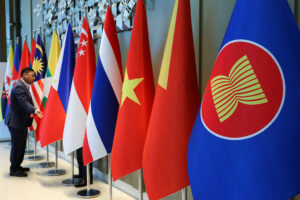By Chloe Mari A. Hufana, Reporter
THE EUROPEAN UNION (EU) offers a roadmap to the closer integration of Association of Southeast Asian Nations (ASEAN) economies, an Italian academic said.
Enrico Letta, Dean of the IE School of Politics, Economics, and Global Affairs at IE University in Madrid, said the EU’s own journey toward economic integration — driven by the removal of internal trade barriers — offers valuable lessons for ASEAN.
“The elimination of internal borders is a big boost for growth,” he told BusinessWorld in an interview on July 25. “We have to understand that internal borders are a limit, and this is the same within ASEAN countries.”
The Philippines and the EU are currently in talks to for a bilateral trade pact, which Philippine officials hope to finalize by 2027.
Negotiations between the Philippines and the EU advanced to a third round in Brussels, between June 16 and 20, with both sides covering 19 critical issues, the Department of Trade and Industry (DTI) said in a statement.
The next round of free trade negotiations is scheduled to take place in the Philippines in October.
Mr. Letta, a former Italian prime minister who also wrote the 2024 report Much More Than a Market for the European Commission, said such agreements are critical at a time when global trade is under threat from rising protectionism by the US and China.
“Only through trade cooperation can we have mutual benefits, but this cooperation (implies) the elimination of internal borders,” he added.
He noted that a Philippine‑EU free trade agreement can serve as a launching pad for broader ASEAN‑EU trade cooperation, adding Manila could play an “avant-garde” role for Southeast Asia.
The DTI described the prospective deal with the EU as the most comprehensive such deal in Philippine history, broadening beyond traditional tariff chapters to encompass labor and environmental standards, intellectual property, competition policy, sanitary measures, and state-owned enterprise regulation.
Philippine-EU trade was $15.5 billion in 2024, making the EU the Philippines’ fifth-largest trading partner, accounting for 7.7% of total trade. Philippine exports to the bloc amounted to $8.1 billion.
Singapore and Vietnam both have free trade deals with the EU, which were signed in 2019 and 2020, respectively. Negotiations with the Philippines were relaunched in October.
Josue Raphael J. Cortez, an ASEAN Studies lecturer at the De La Salle-College of St. Benilde, said an EU trade deal could carry strategic weight as the country assumes the ASEAN chairmanship in 2026.
“With our leaders also devising ways to better navigate the negative repercussions of the nuanced reciprocal tariffs imposed by the US, it is high time that we steer discussions on how we can better promote our aspiration of becoming a single market,” Mr. Cortez said via Messenger.
“While ASEAN’s Community Visions and the ASEAN Economic Community Blueprint (AEC Blueprint) have long championed economic integration, actual progress has been slow due to wide development gaps and structural asymmetries between maritime and mainland member states,” he added.
Mr. Cortez noted that, unlike the EU, ASEAN is not geographically contiguous, and its member states specialize in different industries.
“What we can do moving forward is to maximize what we have in common — agricultural products, semiconductors, and mineral resources — and better utilize intra-ASEAN mobility to promote a sustainable production environment,” he said.
He added that a Philippine-EU deal could become a blueprint for regional partners seeking to reduce dependence on traditional trade allies and expand relationships with like-minded economies.
“The Philippines may serve as a negotiating model for how its neighbors can deepen ties with the EU despite normative differences. It may even take the lead in representing ASEAN’s collective interests in future trade negotiations,” Mr. Cortez said. “This agreement, if finalized, won’t just open up European markets. It could also shape how Southeast Asia reimagines its role in global trade.”

